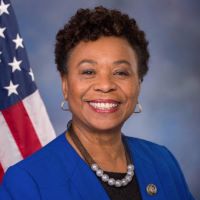U.S. Congresswoman
Barbara Lee (CA-13)

Congresswoman Barbara Lee was first elected to Congress in 1998. She notes that as a social worker by profession, being an advocate for people in dealing with the federal bureaucracy has been a priority. While she was in graduate school at UC Berkeley, Congresswoman Lee started a community mental health organization, called the Community Health Alliance for Neighborhood Growth and Change (Change, Inc.) because she saw a need in her community for mental health care, community education, and advocacy. It was her social work experiences that led her to be the social and racial justice advocate she is today.
Born in El Paso, Texas, Congresswoman Lee graduated from Mills College in Oakland in 1973 and received her Master’s in social work from the University of California in Berkeley in 1975. She began her political career as an intern in the office of her predecessor, the late-Congressman Ron Dellums, where she eventually became his Chief of Staff. Before being elected to Congress, she served in the California State Assembly from 1990-1996 and the California State Senate from 1996-1998.
Congresswoman Lee has consistently been a progressive voice in Congress, dedicated to creating a more equitable society by fostering social and economic justice, international peace, and civil and human rights. She is committed to eradicating poverty, expanding opportunities, and protecting the most vulnerable in our society.
Congresswoman Lee continues to be the lead sponsor of the Improving Access to Mental Health Act, which would increase reimbursement rates for clinical social workers in Medicare, allow them to bill independently at skilled nursing facilities, and bill for Health and Behavior Assessment and Intervention services.
Congresswoman Lee is a member of the influential Appropriations Committee. She also serves on the Budget Committee, advocating for community investments. Furthermore, Congresswoman Lee is in Democratic Leadership as Co-Chair of the House Democratic Steering Committee, Chair of the Task Force on Poverty and Opportunity, past-Chair of the Congressional Black Caucus, and the Congressional Progressive Caucus.
After Congressman Ed Towns (D-NY) retired from Congress, Congresswoman Lee became the Chair of the Congressional Social Work Caucus where she works to unite members of Congress interested in promoting social workers and the clients we serve.